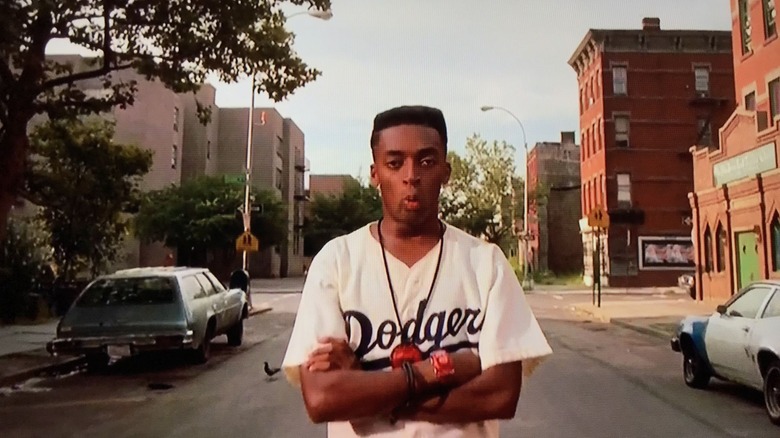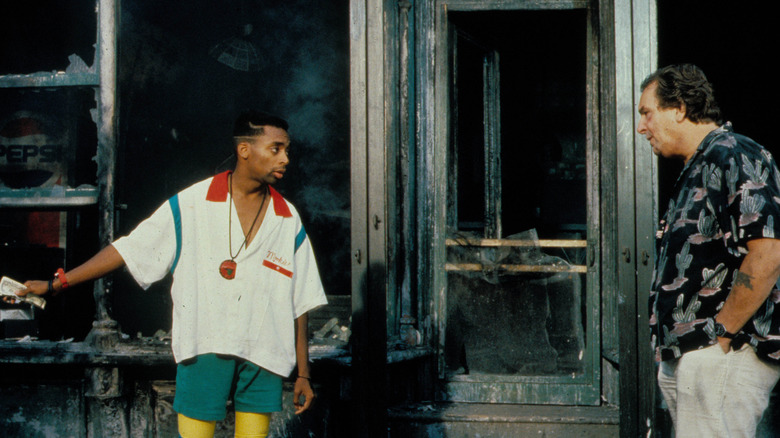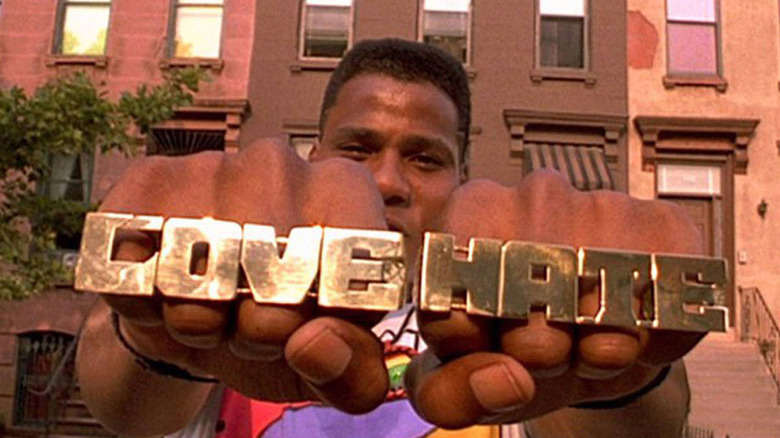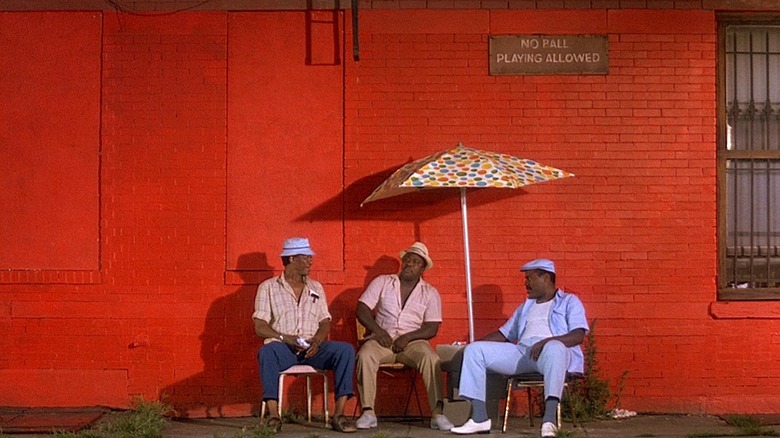The Do The Right Thing Controversy Explained
In 1989, a movie came out that offered audiences a fresh, colorful, scathing insight into race relations in the United States. That movie wasn't "Driving Miss Daisy," the twee and patronizing tale of an elderly white woman and her Black driver in 1940s Georgia. "Daisy" won Best Picture at the Academy Awards, mystifyingly beating a strong field rounded out by "Born on the Fourth of July," "Dead Poets Society," "Field of Dreams," and "My Left Foot."
The movie I'm talking about, of course, is Spike Lee's sizzling masterpiece, "Do the Right Thing," which inexplicably wasn't even in the running for the big Oscar award while making do with scraps — a nomination for Best Original Screenplay for Lee and Best Supporting Actor for Danny Aiello.
Set over one long, very hot summer's day in the Bed-Stuy neighborhood in Brooklyn, it follows slacker delivery guy Mookie (Lee) as he ferries pies to customers on foot and generally goofs off from work at Sal's Famous, a pizza joint run by hotheaded Italian-American Sal (Aiello) and his two sons, happy-go-lucky Vito (Richard Edson) and uptight racist Pino (John Turturro).
We meet many other residents of the largely Black neighborhood, including Da Mayor (Ossie Davis), the shabby, alcoholic elder statesman and his unrequited love, Mother Sister (Ruby Dee), the highly-strung matriarch of the block; Buggin' Out (Giancarlo Esposito), the perpetually agitated big-mouth with a cherished pair of Reeboks; Radio Raheem (Bill Nunn), a moody wandering soul blasting Public Enemy from his boombox; and Mister Señor Love Daddy (Samuel L. Jackson), a local DJ who acts as a one-man Greek chorus from his street-window studio.
As the thermometer rises and racial antagonism escalates towards a devastating conclusion, the question is: can anyone Do the Right Thing?
Warning: major spoilers for the plot of "Do the Right Thing."
What Happens in Do the Right Thing?
As white cops prowl the streets, tensions come to a head when Buggin' Out, a regular at the pizzeria, is struck by the absence of Black celebrities on Sal's Wall of Fame. An argument ensues and Sal kicks him out, causing Buggin' Out to organize a boycott, desperately searching for others to join him in his crusade.
Most people aren't interested; they grew up on Sal's pizza and don't really care about the lack of diversity in the decor. The only person willing to join Buggin' Out's boycott is Radio Raheem, who has already had a run-in with Sal over playing his boombox loudly in the restaurant.
It's the end of the day and things get out of hand; Sal loses his temper at Raheem's refusal to turn down his music, starts spewing racist slurs and smashes the boombox with a baseball bat. Raheem reacts violently, trying to strangle Sal. The cops arrive on the scene and end up choking Raheem to death. When they realize what they've done, they quickly scamper, leaving Sal and his boys facing an angry crowd.
That's when Mookie decides to throw a trash can through the window of the pizzeria, kicking off a riot that leaves Sal's Famous in blazing ruins. As the smoke clears, Smiley (Roger Guenveur Smith), a mentally disabled man who has spent the whole movie trying to sell hand-colored pictures of Martin Luther King and Malcolm X, pins one of his photos to what's left of the wall. Finally, Buggin' Out got some Black faces on the Wall of Fame, but at a terrible cost to Raheem and the whole community.
Does Mookie Do the Right Thing?
There are many articles and think pieces that focus on this question. Early in the film, Mookie is stopped on one of his delivery runs by Da Mayor, who tells him to "always do the right thing."
Mookie is a bad employee and bad father, so that advice could apply to many aspects of his life. It comes into question most with his decision to throw the trash can. Some people interpret this as Mookie's way of diverting the mob's anger away from Sal and his sons to the pizzeria, causing plenty of destruction but saving them from violence. That was my first read on the scene but, having watched the film again for this article, I'm not so sure. The crowd's behavior towards Sal is less threatening than I remembered, and Mookie's act of vandalism is what sparks the riot.
Maybe the question should be whether anyone does the right thing, not just Mookie. The cops obviously don't; Buggin' Out and Raheem instigate the situation in the first place; Sal reacts in the worst possible way to their provocations; we even see Mother Sister caught up in the mob justice, screaming for the pizzeria to be burnt down. The only person who does the right thing in those critical moments is Da Mayor, pleading for people to go home before they do something they'll regret.
The film concludes with two quotes. One is from Martin Luther King, rejecting violence as a means of protest; the other is from Malcolm X, advocating violence as a means of self-defense. This double quote is essential to the film, although it raises more debate than it settles, in parallel and contrast to Raheem's earlier Love/Hate speech, which ironically came down hard on the side of Love.
What Was the Controversy About the Film?
On its release, some critics were very vocal about suggesting that "Do the Right Thing" might incite Black audiences to riot. Spike Lee kicked back against those reactions:
"I'll tell you my least favorite: the reviews of David Denby and Joe Klein saying that Black people were going to riot after seeing this film. That they weren't intelligent enough to make the distinction between what's happening on screen and what happens in real life — so they would come out of theaters and riot all across America... Because that was just outrageous, egregious and, I think, racist. I don't remember people saying people were going to come out of theatres killing people after they watched Arnold Schwarzenegger films."
Maybe we can speculate that the "Driving Miss Daisy" Oscar triumph mean that the Academy were also anxious about it, rewarding a cozy tale of reconciliation while ignoring a vital film that took a long hard look at what life was really like for many Black Americans.
Skip forward almost 30 years, and a movie came out that gave a scathing insight into race relations in the United States. That movie wasn't "Green Book," an entertaining but toothless throwback that reversed the roles of "Driving Miss Daisy" while preaching the same old story of reconciliation. "Green Book" won Best Picture at the Academy Awards, while Spike Lee's "Blackkklansman" made do with a solitary win for Best Adapted Screenplay and five other nominations, including Best Picture and Best Director for Lee.
That was some progress, at least.
While "Blackkklansman" cannily used its period setting to call out the white supremacist then residing in the White House, "Do the Right Thing" still feels like the more contemporary film, raging from the late '80s and still interrogating the present.



